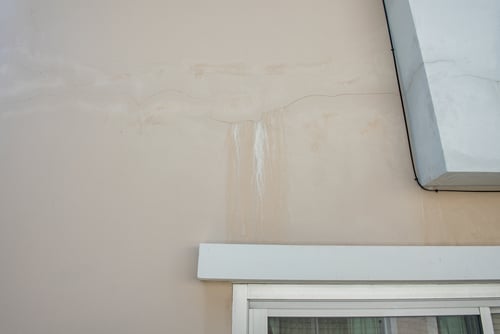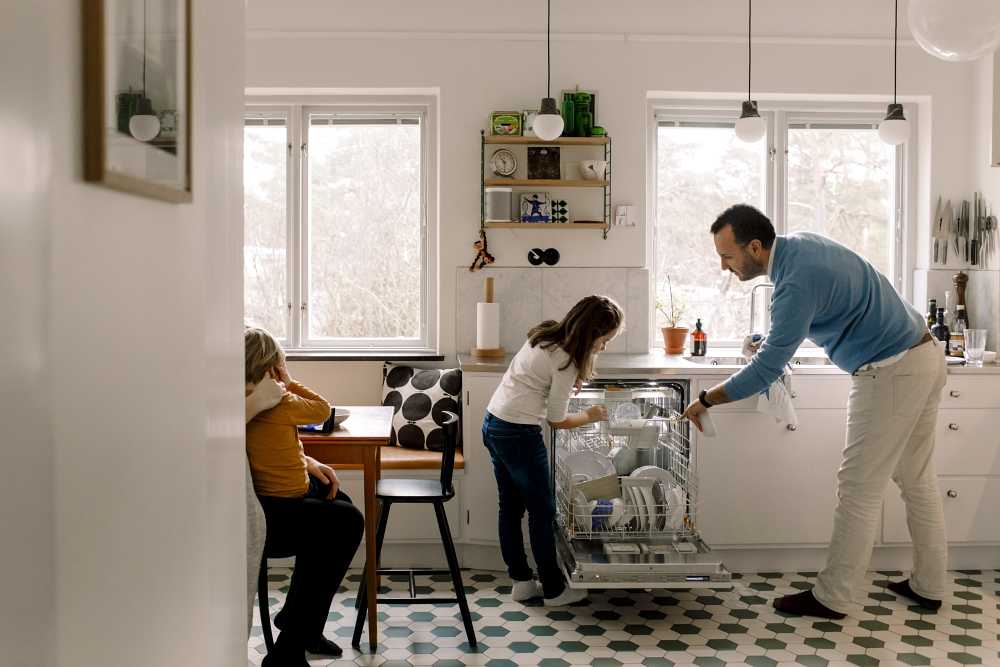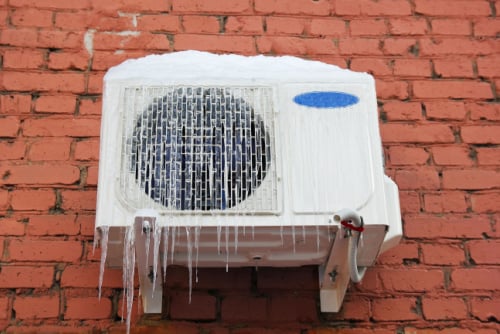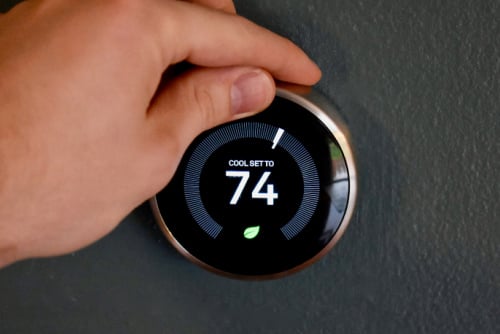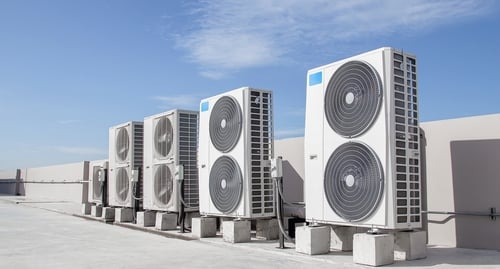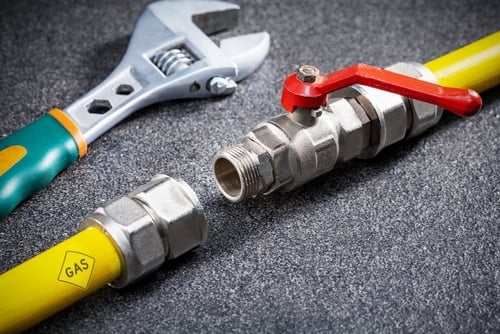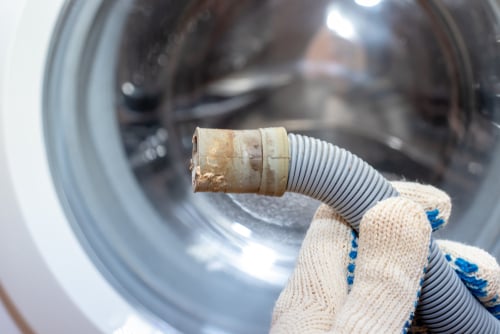There are several urgent home issues that should never be ignored as they can be dangerous, result in further damage, and be extremely costly. Here are a few to consider:
- Gas leaks
- Electrical problems
- Pest infestations
- Foundation cracks
- Roof damage
- Water leaks
- Mold growth
- HVAC system malfunctions
- Plumbing problems
- Insufficient insulation
1. Gas leaks
If you smell gas in your home or suspect a gas leak, you should immediately evacuate the premises and contact your gas provider or emergency services. Gas leaks can be extremely dangerous and pose a significant risk of fire or explosion.
What to do:
- Leave the area immediately
- Do not use flames or electrical devices including your phone until you have moved away from the premises
- Warn others so they can also evacuate
- Ventilate the area
- Contact emergency services
- Do not return inside until the gas company or emergency responders inform you it is safe to do so
- Seek medical attention if you are experiencing symptoms such as dizziness, nausea, headaches, or difficulty breathing
2. Electrical problems
Faulty wiring, flickering lights, frequently tripping circuit breakers or outlets that don't work should never be ignored. These issues can indicate electrical hazards, such as the risk of electrical fires or electric shocks.
What to do:
- Turn off the power
- Unplug appliances
- Inspect outlets for potential burn marks or damage that could be a safety issue
- Call a Pro
3. Pest infestations
If you notice signs of pests like rodents, termites, or cockroaches in your home, it's important to take action immediately. Ignoring pest infestations can lead to property damage, spread of diseases, and the need for costly extermination services.
What to do:
- Try to identify the type of pest
- Attempt to determine if the infestation is localized to a certain area of the household or if widespread
- Determine if there are entry points where pests are gaining access
- Consider pest deterrents that are made of natural sources before resorting to traps
- Consider the use of pesticides. Keep in mind pesticides are often not safe to use around children or pets. It’s important not to come in contact with pesticides as they are often extremely toxic.
- Reach out to a Pro for assistance
4. Foundation cracks
Cracks in the foundation can indicate structural issues with your home. Ignoring these cracks may result in further damage, such as uneven floors, misaligned doors and windows, and even compromised structural integrity.
Structural concerns, including cracks in walls, sloping floors, or sticking doors/windows, may indicate underlying structural problems.
Seeking professional advice as soon as possible is important to address these issues and prevent further damage.
What to do:
- Assess the apparent severity of the damage
- Take photo documentation from multiple angles and notes about what you believe may have occurred
- If you have noticed changes in time, be sure to make notations about the progression of damage
- Continue to monitor any changes
- Consult a Pro to determine if there is an immediate safety or structural issue as a result of the damage
- If a crack that is wider than ¼ inch, then it’s recommended you seek professional guidance
- If the crack is allowing water into the foundation or your basement this needs to be addressed promptly. Water damage can lead to mold or mildew growth.
- Consider the soil conditions surrounding your foundation. For example, clay-heavy soils are prone to excess moisture and could lead to foundational issues.
- Attempt to evaluate the structural integrity. If you’re at all worried that there is a safety issue you should contact a Pro and have the foundation inspected.
- Be sure to get multiple opinions, especially if you are planning to have work done on the foundation.
- Inquire about preventative measures that might help avoid cracks or other foundational issues in the future.
5. Roof damage
Damaged or missing shingles, leaks, or sagging areas on your roof should not be ignored. Ignoring roof issues can lead to water damage, compromised insulation, and potential structural damage to your home.
What to do:
- Assess and document the damage
- Make temporary repairs, if possible, such as using a tarp or other materials to cover a hole and prevent water from getting inside your home
- Contact your insurance agency if you have homeowner’s insurance to report the damage and provide information regarding your assessment of the damage
- A Pro roofing contractor will be needed for repairs
- Do not delay repairs as damage from an unrepaired roof can cause further damage can vastly decrease the value of your house as an asset
- Consider preventative measures to avoid future damage
- Follow up with your insurance company to ensure the claim process is moving forward
6. Water leaks
Whether it's a dripping faucet, a leaking pipe, or water seeping through walls or ceilings, any water leak should be addressed promptly. Ignoring water leaks can lead to mold growth, structural damage, and higher water bills.
What to do:
- Identify the source of the leak
- If possible, turn off the water supply to that particular area
- Assess and document the damage
- Call a Pro
- Depending on the type of leak, you may require assistance from a plumber, a roofing professional, an appliance repair specialist, or a Pro in another area of expertise
- Determine the appropriate repairs
- Contact insurance about coverage for repairs
- Consider preventative measures to avoid future leaks
7. Mold growth
Mold can thrive in damp and poorly ventilated areas. If you notice mold growth, especially in large quantities, it should be addressed promptly. Prolonged mold exposure can cause respiratory problems and allergies.
Mold needs moisture to grow. Reasons for mold growth may include:
- Leaks
- Poor ventilation
- High humidity
What to do:
- Identify and document the affected areas
- Determine if the mold is localized or widespread throughout the house
- Inhalation of mold can be a health hazard, be sure to wear protective gear including an N95 respirator mask or similar, gloves, and eye protection to avoid exposure
- Isolate the area to avoid the spread of mold spores
- DIY clean-up can be considered for small, isolated areas of mold growth
- Call a Pro if mold growth is widespread or if you have health concerns
- You may need to dispose of materials that have been affected by mold. This may include drywall, ductwork, and other areas that are not in plain view or easily accessed.
- As a preventative measure, it’s sensible to regularly check areas throughout your house for possible mold contamination. Signs of moisture, including leaks, are likely sources of potential mold growth and should be promptly repaired.
8. HVAC system malfunctions
Problems with your heating, ventilation, and air conditioning (HVAC) system can lead to discomfort, poor indoor air quality, and increased energy bills. Ignoring HVAC issues can result in more extensive damage and the need for costly repairs or replacement.
What to do:
- If you have a gas-powered HVAC system and smell gas, you should evacuate the house immediately and call the gas company or emergency services
- If you smell burning or see smoke, turn off the system and immediately contact a Pro
- This could be a sign of electrical or mechanical issues
- Check the functionality of your thermostat and circuit breaker
- Check air filters to see if they appear clogged as dirty filters reduce airflow and strain the system
- Exercise caution when you attempt DIY
- Some HVAC fixes can be done yourself. Video chat with one of our Experts to get professional guidance and advice.
- Contact a Pro to have your HVAC system assessed
- Regular maintenance of your HVAC system is the best way to prevent unexpected issues
9. Plumbing Problems
Clogged drains, leaky pipes, or running toilets can waste water and result in water damage. Additionally, hidden leaks can lead to mold growth and compromise structural integrity.
What to do:
- In a plumbing emergency, turn off the water
- Any situation involving water in contact with electrical components is a safety hazard. Turn off electricity in the area to avoid danger.
- If you leak, contain it as quickly as possible
- Contact a Pro
- A running toilet that continues to run is not only wasteful but quickly runs up a hefty water bill
10. Insufficient Insulation
Poor insulation can lead to energy loss, increased utility bills, and discomfort. Proper insulation helps maintain a comfortable indoor environment and reduces energy consumption.
Professional Help with Common Household Repairs
Even those who love to DIY know when it’s best to call a Pro.
Professionals can complete repairs quickly and hiring a Pro will save you valuable time and avoid frustration.
Professionals provide:
- Safety
- Security
- Expertise
- Experience
Professionals have the necessary knowledge and experience, learned through extensive training, to accurately diagnose problems and provide effective solutions.
A Pro can ensure that the repairs comply with codes and regulations. This matters because non-compliant repairs can expose you to unwanted aggravations during inspections.
When considering the best way to protect the asset value of your home, it’s best to leave it up to the Pros.
Contact Frontdoor Today about Urgent Home Maintenance Issues
There are certain maintenance issues you shouldn’t ignore. Many serious home maintenance concerns are not sensible DIY jobs. These are situations when it’s best to call in the professionals.
At Frontdoor®, we know you love getting things done around the house. Staying in control of your to-do list is easier when you can keep the small things from turning into bigger—and more expensive—ones. We’re here to answer your home repair and maintenance questions in real time.
Want to learn more about important home maintenance tasks or tips for common household repairs? Download the app if you haven’t already, and chat with a helpful, friendly Frontdoor Expert.
Was this article helpful?
